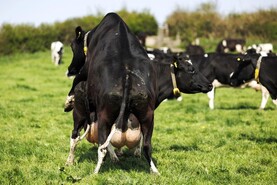We have thankfully settled into a winter routine here in Carrickmacross. This is the first year that I have had a full time, off-farm job since finishing my third level education. So it has been non-stop since we started feeding all the cattle outdoors back in September.
Between slaughtering beef cattle, sourcing store animals to replace them, drafting lambs and tupping the ewes, it really has been a hectic couple of months. This has only been possible with the help of my father, so it’s a team effort. When I’m away on business, he feeds and minds the farm and then when I’m based locally he has some time off. It is working really well so far, because no one carries the brunt of the work. We both enjoy farming without it being a chore.
It really focuses the mind on the time spent farming, something which full-time farmers should really look at. Because our time is so precious, jobs around the farm become prioritised quite rapidly. No longer does trivial matters like muck in the yard or a dirty tractor become a concern for us. One cannot expect the place to be immaculately tidy when the farming day consists of a half hour in the morning and half hour in the evening.
Grazing
Out in the field, the only animals still grazing are my ewes. They seem to have responded well to the oestrus synchronization programme with 90% covered in the first five days. There is only one ewe that has not got a raddle mark. So hopefully this translates to good scanning figures.
All fingers point to an extremely busy first week in April. They have just finished off cleaning out a reseed that was done in the summer and they have done an excellent job. I have secured 10 acres of wintering for the ewes that has good quality grass that I also had last winter. This proved invaluable as it allowed the ewes to stay out until new year and allowed all my own land to build good covers of grass for ewes and lambs after lambing.
Body condition score
The last time the ewes were in the yard I handled them all for body condition score. I am pleased that they all averaged between 3.25-3.5. This has probably helped to give us such a successful breeding season.
The ewes haven’t been treated for worms or fluke since May because I was happy they were clean and held their body condition. This has only been possible by rotational grazing breaking the parasite cycle. I will now dung sample and decide on appropriate form of action.






 This is a subscriber-only article
This is a subscriber-only article











SHARING OPTIONS: